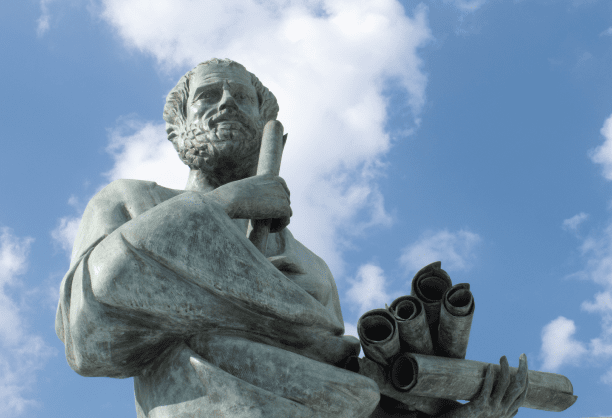Catholic Classical Homeschooling: Philosophy
Following a Catholic classical homeschooling model means tackling subjects that are generally omitted in public education. Classical homeschooling incorporates pre-modern approaches to education, including subjects such as logic, rhetoric, theology, and philosophy. In this article we are going to focus on the subject of philosophy: why should we learn philosophy in our Catholic homeschools, and what sorts of courses are offered by Homeschool Connections.
Why Learn Philosophy?
What is philosophy exactly, and why should our students learn it? There are many different definitions of philosophy floating around out there, some more helpful than others. One handy definition is that philosophy is the study of the fundamental nature of knowledge, reality, and existence. Another definition is that philosophy consists in everything we can know about the ultimate truth about things from reason alone (this one is helpful when we are contrasting philosophy to theology, which is what we know about the ultimate truth from the perspective of divine revelation).
The study of philosophy not only teaches particular truths about life and the human person, but it inculcates students with a disposition of truth-seeking. The reflective person is not only one who knows, but who knows why and how they know. Philosophy teaches us to question how we know what we think we know, testing our assumptions against the weight of truth. Philosophy thus challenges us to be critical thinkers. This not only has many practical benefits (e.g., a critical thinker is less likely to be duped by falsehoods), but it is an integral part of character formation according to the classical model. It shapes not only our thought process, but our ethics and how we approach the problems of life.
For more on why your teen should learn philosophy, we recommend Dr. Jean Rioux’s articles “Top-5 List: Why Study Philosophy?” and “Why Should My Homeschooled Child Learn Philosophy in High School?”
Homeschool Connections’ Logic and Philosophy Options
Unless you are well-versed in philosophy, you are probably going to want to find a tutor or enroll your student in a course. Homeschool Connections has a broad collection of courses in logic and philosophy to choose from taught by excellent instructors who are masters in the field.
If you would like a LIVE, interactive course, we offer Philosophy year-round (fall, spring, and summer semesters) here, LIVE Online Classes. The advantage of a LIVE course is that you have direct contact with the teacher each week in the classroom and also via email outside of the classroom.
Here is a comprehensive list of Homeschool Connections’ current logic and philosophy offerings from our Recorded Course Catalog. Click the links to go to a course’s Moodle page to see more details. If you do not have a Moodle account, you can peruse the philosophy and logic section in our recorded catalog.
Available Philosophy Courses Online for Catholic Homeschoolers
Introduction to Formal Logic: Thinking With Excellent (Phillip Campbell)
Basic Symbolic Logic (Sam Nicholson, PhD)
Basics of Inductive Reasoning (Sam Nicholson, PhD)
Rhetoric and Reasoning (Sam Nicholson, PhD)
Syllogistic Logic (Sam Nicholson, PhD)
Classical Syllogistic Logic (Sam Nicholson, PhD)
Bioethics and Human Dignity (Kris Correira)
How to Battle Relativism, Nihilism, and Other Errors (Sam Nicholson, PhD)
Philosophy: Mind, Body, and Soul (Sam Nicholson, PhD)
Philosophy 101: What Do Philosophers Do and How Do They Do it? (Jean Rioux, PhD)
The Philosophy and Apologetics of Beauty (Bill Donaghy)
Philosophy of God (Jean Rioux, PhD)
Plato: An Introductory Reading (Julian Ahlquist)
Critical Thinking, Catholicism, and History (Christopher Martin, PhD)
An Introduction to the Summa Theologica, Parts I & II (Dave Palmer)
Thomistic Christian Philosophy, Parts One & Two (Dave Palmer)
St. Thomas on the Human Person (Jean Rioux, PhD)
Philosophy: Introduction to Early Modern Philosophy (Jean Rioux, PhD)
Philosophy: Ethics (Jean Rioux, PhD)
Great Questions in Philosophy (Jean Rioux, PhD)
Revolution: The Progress of Liberalism (Phillip Campbell)
Plato: The Trial and Death of Socrates (Julian Ahlquist)
Theories of Knowledge (Sam Nicholson)
Early Greek Philosophy (Julian Ahlquist)
Virtue and Vice: Ancient Philosophy for Modern Catholics (Sam Nicholson, PhD)
Conclusion
There’s obviously a lot to look through here; bookmark this page and come back to it as you prepare to sort out your homeschooled child’s philosophy courses. It can look daunting (especially if you don’t have a philosophy background), but philosophy is nothing to shy away from! On a personal note, my daughter fell in love with philosophy after taking Dr. Jean Rioux’s philosophy courses. She went on to double major in mathematics and philosophy in college. The study of philosophy was integral in shaping her intellectual development and academic interests.
You may find the same holds true for your own student. While not everyone will be inspired to major in philosophy, a solid grounding in classical philosophical tradition will help shape your child’s mind to appreciate the Good, the True, and the Beautiful.
What are your thoughts on this topic? To continue the discussion, join me and other homeschooling parents at our Homeschool Connections Community or our Facebook group!






